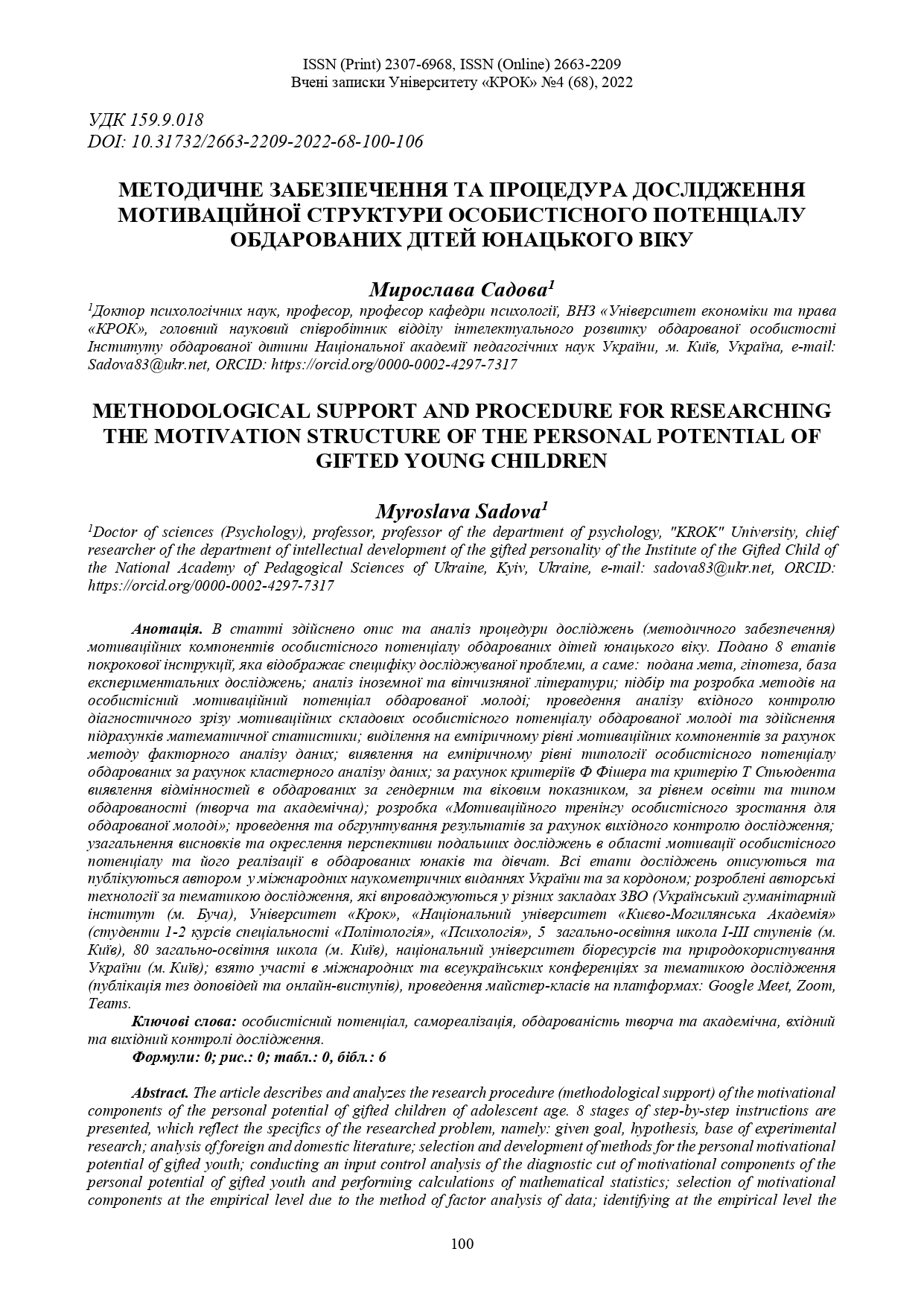МЕТОДИЧНЕ ЗАБЕЗПЕЧЕННЯ ТА ПРОЦЕДУРА ДОСЛІДЖЕННЯ МОТИВАЦІЙНОЇ СТРУКТУРИ ОСОБИСТІСНОГО ПОТЕНЦІАЛУ ОБДАРОВАНИХ ДІТЕЙ ЮНАЦЬКОГО ВІКУ
DOI:
https://doi.org/10.31732/2663-2209-2022-68-100-106Ключові слова:
особистісний потенціал, самореалізація, обдарованість творча та академічна, вхідний та вихідний контролі дослідженняАнотація
В статті здійснено опис та аналіз процедури досліджень (методичного забезпечення) мотиваційних компонентів особистісного потенціалу обдарованих дітей юнацького віку. Подано 8 етапів покрокової інструкції, яка відображає специфіку досліджуваної проблеми, а саме: подана мета, гіпотеза, база експериментальних досліджень; аналіз іноземної та вітчизняної літератури; підбір та розробка методів на особистісний мотиваційний потенціал обдарованої молоді; проведення аналізу вхідного контролю діагностичного зрізу мотиваційних складових особистісного потенціалу обдарованої молоді та здійснення підрахунків математичної статистики; виділення на емпіричному рівні мотиваційних компонентів за рахунок методу факторного аналізу даних; виявлення на емпіричному рівні типології особистісного потенціалу обдарованих за рахунок кластерного аналізу даних; за рахунок критеріїв Ф Фішера та критерію Т Стьюдента виявлення відмінностей в обдарованих за гендерним та віковим показником, за рівнем освіти та типом обдарованості (творча та академічна); розробка «Мотиваційного тренінгу особистісного зростання для обдарованої молоді»; проведення та обгрунтування результатів за рахунок вихідного контролю дослідження; узагальнення висновків та окреслення перспективи подальших досліджень в області мотивації особистісного потенціалу та його реалізації в обдарованих юнаків та дівчат. Всі етапи досліджень описуються та публікуються автором у міжнародних наукометричних виданнях України та за кордоном; розроблені авторські технології за тематикою дослідження, які впроваджуються у різних закладах ЗВО (Український гуманітарний інститут (м. Буча), Університет «Крок», «Національний університет «Києво-Могилянська Академія» (студенти 1-2 курсів спеціальності «Політологія», «Психологія», 5 загально-освітня школа І-ІІІ ступенів (м. Київ), 80 загально-освітня школа (м. Київ), національний університет біоресурсів та природокористування України (м. Київ); взято участі в міжнародних та всеукраїнських конференціях за тематикою дослідження (публікація тез доповідей та онлайн-виступів), проведення майстер-класів на платформах: Googlе Meet, Zoom, Teams.
Завантаження
Посилання
Амірхан Д. Методика «Індикатор копінг стратегій» 2018 URL: http://surl.li/ehdri
Реан А. Методика «Мотивація успіху та страх невдачі». 2013. URL: http://iqholding.com.ua/blogs/motivatsiya-uspikhu-ta-strakh-nevdachi
Самоактуалізаційний тест Е. Шострома в адаптації Ю. О. Альошиної, Л. Я. Гозмана, М. В. Загіка та М. В. Кроз. 2016. URL: http://psychologis.com.ua/samoaktualizacionnyy_test_-_sat-1.htm
Садова М.А., Свинаренко Р.М. Психологічні складові потенціалу самореалізації особистості та картині світу суб’єкта. Монографія / За ред. В.І. Подшивалrіної. Одеса : Астропринт, 2011. 416 с.
Садова М. А. Аналіз зарубіжних досліджень мотиваційних аспектів в структурі особистісного потенціалу обдарованих дітей юнацького віку. Освіта та розвиток обдарованої особистості. Сесія: психологія. №2 (85), 2022. С. 50-62.
Maslow A. H. Toward a psychology of beind New York, 1968. 260 p.

Downloads
Опубліковано
Як цитувати
Номер
Розділ
Ліцензія
Авторське право (c) 2022 Мирослава Садова

Ця робота ліцензується відповідно до Creative Commons Attribution 4.0 International License.

